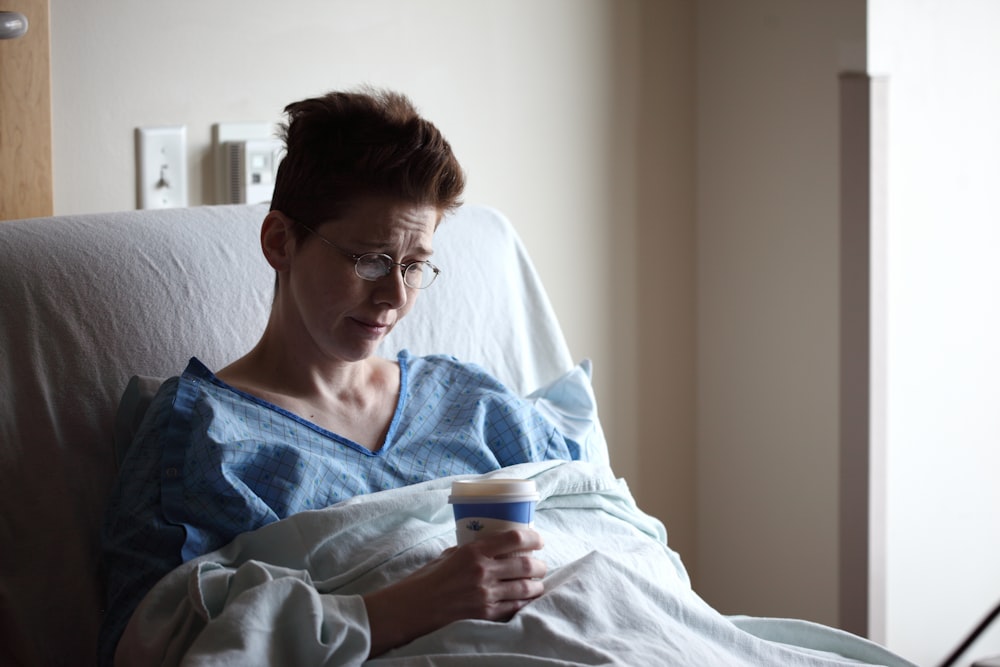
The side effects of chemo can be very uncomfortable, stressful, and downright awful. Someone on chemo could experience hair loss, fatigue, loss of appetite, nausea and swollen feet or ankles and general pain or discomfort. Those are just some of the side effects of chemo.
In general, chemotherapy can make you feel terrible – even after just a few weeks of being on it. Chemotherapy affects different people in different ways. Some people will be so affected by the treatment, they’ll barely be able to get out of bed or eat a bite of food. Others find their side effects of chemo to be a bit more manageable.
Since chemotherapy is one of the most effective treatments for cancer, however, the awful side effects are something that most cancer patients are willing to endure. Fortunately, there are ways to cope with these side effects.
Let’s explore some of the most common and problematic side effects of chemo, and discuss what you or your loved one could do to cope with them.
What Are The Side Effects of Chemo?
The first thing you need to know about chemotherapy is that there’s more than one type of chemo. Just as there are many types and stages of cancer, there are also varied types of chemotherapy to treat the illness. Unfortunately, all forms of chemotherapy can (and usually do) cause side effects. No matter what type of chemo someone starts, chances are, they’ll experience some tough side effects.
Chemo causes these uncomfortable side effects for a number of reasons. In the body, cancer cells often grow rapidly, and chemo drugs kill those quickly growing cells. Because the substances of your chemo treatment flow throughout the body, however, they can also cause damage to normal, healthy cells too.
Most chemotherapy treatment is intravenous chemotherapy. The intravenous substance is fed into your body via your vein, allowing it to move rapidly around your organs in the bloodstream. Common symptoms of intravenous chemo include:
- Weakened heart and chest muscles
- Hot flashes and early menopause
- Anxiety and depression
- Brain fog (chemo brain)
- Hair loss
- Mouth sores
- Digestive distress
- Decreased or red urine
- Discoloured and cracked nails
- Nausea and vomiting
- Loss of appetite
- Lower blood cell count
- Bone loss
- Skin sensitivity
- Poor coordination and tired muscles
- Swollen feet and hands
- Sexual dysfunction
Oral chemotherapy drugs are a little less common, but they can be helpful for various types of cancer treatment or prevention. These pills are taken from home, on a daily basis, for a set number of weeks according to a schedule given by your doctor. Oral chemotherapy drugs have a lot of the same side effects as intravenous chemotherapy. The most common side effects of oral chemotherapy are:
- Fatigue and trouble sleeping
- Nausea and vomiting
- Weakness
- Loss of appetite
- Weight loss
- Diarrhoea
- Hair loss
- Finger and toenail changes
- Nerve damage
- Menstrual changes
- Fertility problems
- Skin changes
- Bleeding gums and mouth sores
- Compromised immune system
- Swollen and painful feet or ankles
- Trouble walking
Note that the above list of side effects of chemo is not a comprehensive list of every possible side effect that can occur. The above is an overview of the most common side effects that tend to cause the most problems for most people on chemo.

Understanding Chemotherapy Side Effects
Before beginning any form of chemotherapy, your doctor will discuss the functionality and potential side effects of the kind of chemo you’re prescribed. Notably, not every person will get every side effect. The severity of your chemo side effects will also vary from person to person. It’s worth speaking to your cancer team about what you should do if certain issues persist.
Doctors can also prescribe medications to assist with certain side effects too, like nausea and vomiting. While some drugs can cause long-term side effects, it’s rare for most people to have long-term issues from this treatment.
The more your doctor knows about you and your situation, the easier it will be for them to choose the right chemotherapy treatment for you. This is why you’ll often undergo many tests before you begin your therapy. Though the side effects may seem severe at times, your doctor will only prescribe a chemotherapy drug if the benefits outweigh the risks.
How to Cope With the Side Effects of Chemo
The side effects of chemo will influence different people in different ways. However, most people find certain issues to be more problematic than others, like fatigue, hair loss, swollen feet, or nausea. Discussing your concerns with your doctor before you begin treatment can help to determine whether any medicinal options might be useful for avoiding these problems.
It’s often best to plan your workdays around your treatment where possible. If you can, avoid physically demanding days the day before and after treatment, and keep a diary of your experiences. You might find patterns that help you to schedule your routine a little better.
Most experts also recommend finding ways to relax with complementary therapies like meditation and massage.
Here are some useful tips on managing the most common side effects of chemo.
Managing Fatigue and Trouble Sleeping
People receiving chemotherapy treatment will often have issues with fatigue simply because the body is under a lot of pressure removing dangerous cells. You’ll likely get tired a lot faster after your treatments and may find it harder to perform typical tasks. Tiredness can also make it harder for you to concentrate, or even control your emotions as usual.
If you want to keep working during your chemotherapy, the best way to handle tiredness is to try and decide to work less around the time you’ll be getting chemo. You can also take regular rests and breaks during the workday and avoid completing physically demanding duties.
As strange as it may sound, physical activities can also reduce tiredness, helping to build up your endurance and minimise stress. A short walk each day could help you to manage the fatigue of treatment more easily.
When it comes to sleep, practise good sleep hygiene by following a regular routine, and making sure you have a comfortable environment for rest. Some people find relaxation sessions before bed helpful, or teas like chamomile and valerian.

Damaged Immune System
Many different kinds of cancer treatments can reduce the number of white blood cells in the body. Since white blood cells are responsible for fighting infection, the fewer cells you have, the more problematic your condition will become.
If your immune system begins to suffer, you’ll likely find yourself suffering from more colds, instances of sore throats, and gastrointestinal bugs. Your doctor or chemotherapy nurse will often advise taking time off work to avoid making the condition worse and ensuring you don’t spend too much time with people who have recently had an illness.
Getting plenty of sleep will improve your immune system, as will eating plenty of the right foods. Foods rich in vitamins and minerals will pack your body full of the energy it needs to fight off infections. Stock up on broccoli, citrus fruits, red bell peppers, ginger, and spinach.
Changes to the Body
Sometimes, the side effects of chemotherapy will also include changes to your body in many different forms. Skin issues like dryness and eczema are common among people receiving chemotherapy treatment. If this happens for you, using a moisturizer approved by your doctor may be helpful. It can also help to take substances like biotin to support the development of health skin, hair, and nails. Remember, hair and nails can also become brittle following chemo.
You might also notice changes in your body in the form of peripheral neuropathy. This is the name for tingling, numbness and pain in your hands and feet. If this happens to you during chemo treatment, it’s best to avoid any tasks that require the use of your hands and feet (as difficult as that can be).
Keeping your hands and feet elevated with regular periods of rest can also help with swelling caused by fluid gathering in the extremities.
Changes to Your Appearance
Changes to your appearance might not be the most uncomfortable of the chemo side effects – but it is something that causes the most stress for many people. Most cancer treatments will often result in changes to your weight, skin changes, hair loss, and even scars from surgeries and biopsies.
Taking vitamins and minerals to preserve and protect your hair, skin and nails is a good way to defend against these issues. Vitamin E, D, iron, and B-vitamins are all extremely useful. Your doctor may also be able to recommend products for reducing hair loss.
For the most part, the best thing you can do when dealing with changes to your appearance is learning some self-love. Cancer will usually change your appearance regardless of what you do. However, surrounding yourself with people who care about you, and learning to love yourself regardless of what you look like will make you feel more confident.
After your treatment is over, you can work on changing your appearance again.
Psychological Side Effects
The side effects of chemo aren’t exclusively physical. Many of the experiences you’ll have following treatment will be psychological too. Living with cancer and having chemotherapy can have an emotional toll. Doctors and nurses can often prescribe anti-depression and anti-anxiety medications to help with this, as well as therapy and support groups.
If your depression persists, your doctor might suggest additional treatments to help you manage your emotions. If possible, make sure you get plenty of sleep and keep yourself as topped up on energy as possible, with plenty of water and nutritious foods. Protecting your body with the right sleep and nutrition makes it easier to defend your mind too.
Do You Have a Genetic Cancer Risk?
It’s possible you have a blood relative going through the chemotherapy treatment program right now. Perhaps this has made you wonder if you have a genetic cancer risk.
Genetically speaking, you could have a higher risk of developing certain cancers. Knowing this about yourself and being given the chance to prevent it is a wonderful gift. CircleDNA will tell you which cancers (if any) you are genetically at a higher risk of developing.
To get a comprehensive health report, including your cancer and disease risk based on your DNA, get a CircleDNA Premium kit today.

Comments are closed.